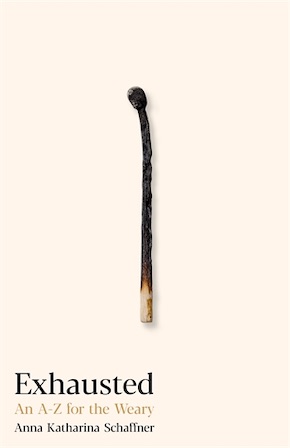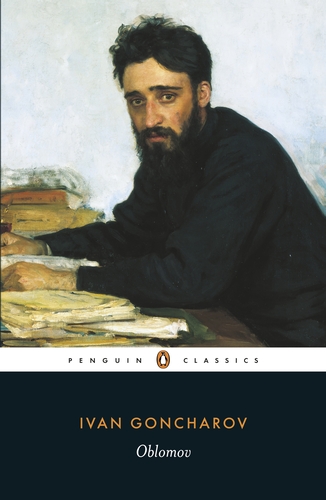O is for Oblomov
by Anna Katharina Schaffner
Oblomov is the infamous anti-hero of the Russian writer Ivan Goncharov’s eponymous novel, published in 1859. He is best known for being an incorrigible slacker. We first encounter him wrapped in his threadbare Oriental dressing gown, refusing to get out of bed. His eyes glide wearily across the dusty objects in his derelict bedchamber. Around him, all is filth and cobwebs – his room hasn’t been cleaned for years, and the plaster ceiling is crumbling. His servant repeatedly urges him to get up, to dress and to shave, but his efforts are in vain. So are those of a string of visitors who try to lure Oblomov from his bed and to convince him to step outside into the St Petersburg spring.
Oblomov’s refusal to leave his bed and to live an active life becomes increasingly problematic. He has to vacate his apartment but can’t muster the energy to look for an alternative; his estate in the countryside is decaying because of chronic neglect and mismanagement. His annual allowance runs out. Tricksters begin to prey on him, robbing him of money he doesn’t even have. But in spite of the existentially threatening nature of his problems, Oblomov just can’t rouse himself into action. Every day, he resolves to write letters to put his affairs in order, but never gets very far. Sometimes, he manages to put a few lines to paper, but then gets caught up in the vexing grammatical question of the difference between restrictive and non-restrictive clauses (in other words when to use ‘which’ and when to use ‘that’). The letters are never finished and never sent, and his affairs deteriorate at an alarming pace.
Oblomov’s friends repeatedly rescue him from bankruptcy, free him from the clutches of various financial exploiters, and do their best to rouse him from his state of inertia. Their efforts prove to be fruitless. He dies young, as a result of too much sleep, too much vodka, wine and red meat, and a lack of exercise. And yet, for all that, his life has not been an unhappy one. In his final years, he finds love, and many people genuinely care for him. Moreover, he has never been lazy merely in the sense of preferring rest to activity, and pleasure and leisure to work. Rather, he has serious philosophical reservations about the active life. As he puts it to his best friend, Stolz: ‘All these society people are dead men, men fast asleep, they are worse than I am! What is their aim in life? They do not lie in bed like me, they dash backwards and forwards every day like flies, but what is the good?’ When Stolz accuses his friend of ‘Oblomovism’, a term he has invented to characterize Oblomov’s turpitude and lack of ambition, Oblomov counters: ‘Doesn’t everyone strive for the very same things that I dream of? … isn’t it the purpose of all your running about, your passions, wars, trade, politics – to secure rest, to attain this ideal of a lost paradise?’
While the land-owning Oblomov, who has never worked a day in his life, symbolises the lethargy, paralysis and self-destructive trajectory of a dying feudal Russia, he also stands as a challenge to the values of work, self-improvement and productivity. He questions the merit of progress, and instead dreams of an earthly paradise where it is not necessary to work, and where, in place of milk and honey, there is plenty of vodka.
When we procrastinate, we remain firmly anchored in the realm of possibility. We don’t narrow down our idea of the future, with all its shimmering possibilities… we try to keep all our options open.”
While he may appear to be a mainly negative figure, an example of what we should all avoid, Oblomov’s views warrant serious consideration in the context of psychoanalyst Josh Cohen’s distinction between slackers, slobs and burnouts. Cohen identifies Snoopy, Garfield, Homer Simpson and the Big Lebowski as slobs in the sense that they are ‘dissidents from the imperative of productivity’. As Cohen explains, slobs differ in a crucial way from those who are burnt out: ‘Unlike the burnout, whose enjoyment of lassitude is spoiled by nervous agitation, shame and guilt, the scandalous courage of the slob embraces the inertial state, and rejects openly the diligence and responsibility that confer full social legitimacy in a culture defined by work and productivity.’ In other words, slobs celebrate their laziness, they love to shock and to provoke disgust, and they enjoy their outsider status. The slob rejects dominant cultural values, in particular the idea that we have to work, to be useful and to be productive. They are a thorn in the flesh of the hard-working, mocking their commitment and modelling a completely different kind of life. Oblomov, however, is more slacker than slob. He doesn’t aim to cause offence, he doesn’t brag. Importantly, he manages to get ever better at enjoying his life. In his final years, he no longer feels guilt and no longer has a nagging desire to change his ways – largely because he has found a woman who loves him as he is and who has become his full-time carer, managing all the practicalities of existence in his stead. In contrast, at the beginning of the novel, his key challenge is procrastination. He is plagued by guilt and anxiety, he feels like he should work, he knows he has to work, but he simply can’t. He has big ideas about what he wants to do with his life and how to fix his estate, and yet he never gets round to translating any of them into action. Not ever managing to start what we most care about is, ironically, exactly the point of procrastination.
Procrastination, Oliver Burkeman suggests, is a way of maintaining a ‘feeling of omnipotent control over life – because you needn’t risk the upsetting experience of failing at an intimidating project, obviously, if you never even start it’. When we procrastinate, we remain firmly anchored in the realm of possibility. We don’t narrow down our idea of the future, with all its shimmering possibilities. By procrastinating, we try to keep all our options open. We preserve the fantasy of optionality. For it is often the crushing gap between the ideal and the real that keeps procrastinators from doing anything. They care so much about their vision that they fear the inevitable imperfections of reality. While they may be avoiders in practice, procrastinators are theoretical perfectionists.
We spend our time trying to get all the tasks that don’t matter but have to be done out of the way, so that we will be free, one day, to work on what really does matter to us. But we have it exactly the wrong way round.”
Many of us tend to postpone the tasks we most care about. This is a tendency I see in myself and in many of my clients. We live in a ‘When Then’ state of mind: when I have got this or that out of the way, when I have gained my degree, finished this project, found the perfect partner, lost weight, feel less stressed at work… then I will do x. That means that many of us never get started on what matters most to us. We spend our time trying to get all the tasks that don’t matter but have to be done out of the way, so that we will be free, one day, to work on what really does matter to us. But logically, we have it exactly the wrong way round. Burkeman argues that we should always work on our most important projects first, not last. He recommends that we dedicate to that which matters most to us at least the first good hour of each day. We need to reverse our thinking, tackle what we genuinely care about first, and then do what we have to do afterwards. That means prioritising, not delaying, writing that novel, meditating, running, learning Japanese, setting up our own business, investing more time in relationships, breeding Siamese cats, travelling the world, or learning to sail.
The American businessman and philanthropist Warren Buffett, too, highlights the dangers of middling priorities. He isn’t interested in curing slobs or slackers such as Oblomov. Rather, he wants to help diligent and motivated people who suffer from getting their priorities wrong. He argues that, if we want to live our lives well, we should make a list of twenty-five things that matter most to us in life, with the most important first. Then, we should focus only on the first five. And rather than keeping the other twenty in the background, as optional/additional items to which we might return when we have extra time, we should avoid spending any time on them at all. Why? According to Buffett, the middling priorities are where the real danger lies – for they are the most potent distractors from our key life goals. That is because we also want to dedicate time to them, and thus we spread ourselves too thinly. Furthermore, it is often much easier to work on what matters less, because what matters most is so highly charged, and the thought of failing at it can be existentially threatening.
Oblomov is a creature of the in-between, as are many of us, to a greater or lesser extent. Half troubled procrastinator, half passionate philosopher of rest, he has two impulses battling for his soul. On the one hand, he feels a desire to shake off his stupor and join the army of the active, to be a master of his own affairs and put an end to his dependency on the kindness of his friends. On the other hand, he is a willing slave to the pleasure principle and also to the death drive – according to Freud, our desire to return to an inanimate state – and he sees beauty in both. He heeds the siren call of stillness and sleep. Yet by renouncing all work, all effort, all inconvenience and risk, he practises a kind of death in life, eliminating many of the things that make life worth living. There is much to learn from him as we seek to lift ourselves out of that in-between place where we can never really achieve anything meaningful.
from Exhausted: An A–Z for the Weary (Profile Books, £15.99)
—

Anna Katharina Schaffner is a cultural historian and professional burnout coach. Her books include The Art of Self-Improvement: Ten Timeless Truths, Exhaustion: A History and the novel The Truth About Julia. She writes regularly for the Times Literary Supplement and Psychology Today. Exhausted is published in hardback and eBook by Profile Books.
Read more
annakschaffner.com
@exhaustioncoach
@ProfileBooks


